- Home
- Sean Platt
The Eden Experiment Page 3
The Eden Experiment Read online
Page 3
He’d heard rumors about Fiona and Connolly, about Eden and Riverbed, about animosity and secret cooperation. But this was the first time he heard any of it from Fiona’s mouth.
“We worked together, once,” Fiona said, reading Ephraim’s disbelief. “Wallace had different ideas about where he wanted to take our research. What’s more, he and I didn’t share the same …” She sighed. “… the same moral imperatives. We parted on friendly enough terms, but they didn’t stay friendly long. Wallace sequestered himself on Eden, and I diverted what we had into Riverbed. But just a few years later Wallace realized that he didn’t have a grasp on an essential element. Something I was project lead on, and that Wallace, apparently, didn’t fully understand.”
Ephraim looked down at the device.
“It’s a mind-mapping system,” Fiona explained. “You’ve heard that thought is simply electrochemical impulses, like a wetware computer?”
Ephraim nodded.
“We, like many researchers, wanted to map a human mind way back when others were mapping the genome. We, like those other researchers, figured it was only a matter of time. Why couldn’t we map minds? The brain is all binary impulses, like a computer’s ones and zeroes. But we kept hitting walls, just like everyone else. Because as anyone with a brain could tell you, objective thoughts aren’t higher-level thinking. It’s one thing for a brain to store data, but ‘emergent properties’ like personality, emotion, and the memory conditioning that makes us who we are — well, that’s something else entirely.”
Ephraim nearly flinched at the word conditioning. Jonathan had talked about it like programming: garbage in, garbage out. You could clone people with enough scripting and conditioned response. Ephraim, looking back, sure had been fooled into believing that Clone Jonathan was the original.
“Quarry is Riverbed’s answer to mapping an entire mind, including emergent properties. Getting it perfect was far from simple, and what’s in your hand is the seventeenth generation of tech that began as what looked like a car-sized hairdryer helmet. It’s also, I’d guess, the reason for the flaws in Eden’s clones. You said the ones in the Islet 09 lab were like statues. Empty shells?”
“They just stood there. No personality.”
“And the Altruance clones who chased you. You said they were like animals? Barely even people?”
Ephraim nodded.
“Based on what I’ve seen of Eden’s work — and unfortunately, it’s far from comprehensive, limited only to what the cloned version of your brother saw — Wallace’s stumbling block was always the mental one. Eden has a process for transferring memories, but it’s not nearly as good as Quarry’s. Eden’s process seems to be incredibly slow and piecemeal. If I had to guess, it’s done in stages, with the last ‘Tomorrow Gene process’ being just the final step.”
“You say ‘Tomorrow Gene’ like it’s not a real thing.”
“I’ll speak straight,” Fiona said, half-sighing. “I don’t think Eden has the ability to rewind the clock for its clients. I don’t think they can make people young again. They can do some light genetic refurbishment, like what they did to you. You look good, Ephraim, but you don’t look twenty. And that’s probably what they’re doing on the primary islands, for guests who want a simpler spa package. It's just a simple refurbishment and repair.”
“But we’ve seen young people who used to be old before they went to Eden. Like Alma Couch.”
“That’s right,” Fiona said. “And you just reminded me that you saw a young Altruance and young Sophie who nearly convinced you that they were the originals, made young.”
Ephraim nodded slowly. He should have connected the dots by now and was shocked to realize he hadn’t.
“You’re saying that none of the ‘young-again celebrities’ who’ve come back from Eden were actually the people who went to Eden. They can’t make old people young. They can only make clones.”
“Exactly. The ‘young Alma Couch,’ from what I see in Eden’s research, is almost certainly a clone. Same for the others.”
“Where’s the original, still-old Alma?”
“Who knows? Maybe she stayed on Eden, on the Denizen. Or maybe it’s more sinister than that. Maybe the originals are somehow disposed of.”
Fiona took the driving straw and adjusted her chair to face Ephraim.
“Do you know what Eden is, most of all?” she asked. “It’s Oz. I think most of what you saw there was smoke and mirrors, with Wallace — even after he died — playing the man behind the curtain. There’s the truth of Eden, and then there’s the spectacle they’ve created to show guests and make it seem like magic.”
“Why?”
“To obscure the truth? To command higher prices? I honestly don’t know. It’s all so different from the Wallace I knew. Wallace was practical, not showy. But to be fair, I don’t know how long Wallace has been dead, and how long the guy you met — Neven — has been in charge. But it makes sense, don’t you think? You saw the Enchanted Forest room, and Sophie and Altruance getting their treatments in a simple room in utilitarian-looking tanks. Who knows what might have come next if you hadn’t pulled them from those tanks? Maybe techs would have woken them up and sent them to the Denizen. Or maybe they never would have woken up at all.”
The image that followed Fiona’s posit chilled Ephraim to the bone. Rows and rows of Tomorrow Gene clients preserved in warehouse tanks, suspended just in case Eden ever needed their bodies or gene sequences again.
Ephraim nodded down at the Quarry device. “What does any of that have to do with this?”
“Eden doesn’t accept someone on a Tomorrow Gene vacation the second they ask for one,” Fiona said, turning her attention to a screen filled with compiled notes on Evermore’s process. “From what I’ve seen, there are months of preliminary treatments before any guest is allowed to visit Eden. They tell their clients that those visits are for prep, but I suspect they’re putting them under and using that time to start the mental reconstruction, take DNA samples, and initiate the process of growing the clones.
“In order for any of Eden’s clones to be convincing — for an Alma Couch clone to be ‘Alma enough’ to be useful as a sex clone — Evermore must be able to reproduce ‘Alma’s mind’ to some degree. It’s not a perfect process; like you said, Jonathan’s clone was ‘off’ enough that you eventually saw through him. Your brother’s clone was close, but he wasn’t your brother. His memories were suspect and incomplete; the small pieces of his true personality just weren’t quite right. I think that’s because Eden’s cloning process still has major problems. Their clones have big mental flaws. They don’t have all the host’s memories. They remember things that didn’t happen, remember incorrectly, or don’t remember entire swathes of the host’s history.”
Ephraim nodded. He remembered Jonathan’s mental flaws just fine.
“The bigger problem was that Wallace’s way of mapping minds was incredibly slow. I’m talking molasses, and that’s on top of its lack of fidelity. I’ll bet Evermore failed to create a viable mind far more often than it succeeded.”
“That might explain the ‘ghosts’ I saw,” Ephraim said.
“Consider Alma. Alma probably went into a local Evermore clinic for her first ‘treatment’ six months before ever going to Eden, and Evermore techs copied a piece of her mind. When she returned, they copied a little more, and so on forever. Only when they were sure they had ‘Alma’s mind’ mostly handled did they accept her onto Eden for her ‘rejuvenation treatment.’ That’s when they finalized the copy, checked its fidelity, and uploaded it into the clone body they had already grown.”
“But the blanks. I saw Alma blanks, and others who’d already gone through the full treatment.”
“They probably keep stock on hand. They have a copy of Alma’s mind on a computer somewhere. Whenever someone orders an Alma, they upload her mind into a fresh body. Keeping them blank probably makes them easier to handle and store. The real Alma Couch probably wouldn’t appreciate
being locked up and held in a cell, after all.”
Ephraim looked down at the Quarry device, noting that Fiona hadn’t answered his question. She’d told him all about Eden’s memory-transfer process, noting its problems, but she hadn’t said a thing about her own.
Ephraim handed it back to Maria, wondering at all the assistant-caregiver was hearing. Was Fiona holding anything back? Or did Maria, who had to act as Fiona’s hands, know it all?
Instead of returning the Quarry to Fiona’s safe, Maria set it in a slim metal box, secured it by closing a latch, and handed it back to Ephraim.
“It’s yours,” Fiona said.
“What am I supposed to do with it?”
“I can’t have you searching the internet for celebrity sex slaves. If this man Neven is out there, he’s smart enough to have people looking for you — and that’s not even accounting for the FBI, who might be watching you as well. But I understand. You need leverage, and you’re not going to feel comfortable talking to Hershel Wood no matter what I say about him owing me favors. So, don’t search the web for proof. Search Hershel instead.”
Fiona glanced down at the box.
More dots connected. Apparently, this was the answer.
Search Hershel instead.
“You want me to …”
Ephraim couldn’t say it. This was as crazy as evil clones. “To what?”
“Meet with Hershel Wood like GEM wants. Maybe he’ll play straight because he owes me, but just in case he doesn’t?” A smile touched her lips. “Find a time to use the Quarry on him. Do that, and we’ll know everything he knows. Everyone’s hiding something, Ephraim.”
“You want me to copy his mind so you can blackmail him?”
“Just as insurance.”
“How long does it take?”
“Thirty minutes, give or take.”
“There’s no way. I can’t even imagine how I’d—”
“Find a way, if you want to get out of the mess you’re in,” Fiona said. “There’s another way to hack Wood, but it’s far messier and slower and probably wouldn’t work. I’d have to try and hijack his MyLife frequency to siphon what we need. But that way is dodgy, requires calling in a lot of favors, and takes weeks to drip.”
“You can hijack a MyLife?”
Fiona’s expression said, don’t ask. But he already knew the answer. The Jonathan clone’s MyLife was being hijacked now. The only difference was that that the dead clone was no longer attached.
Ephraim looked at the box containing the Quarry. If Fiona was right, the plan wasn’t terrible. If he could get Hershel’s secrets, then he’d end up playing ball by default.
The only problem was Fiona — and the fact that even if Ephraim believed what she said, he didn’t trust it.
“I have ideas for how you can sedate Wood and get the Quarry on him. Maria will explain how it works and take you through it.”
Ephraim thought, weighed Fiona’s gaze, then extended the Quarry box toward Maria. “No. I won’t do this for you.”
“It’s for you, not me. Once you have Wood’s mind on record, you won’t have to worry about whether he’ll be on your side. This needs to be done, Ephraim, like it or not.”
“No. It’s wrong.”
Maria crossed her arms. The box stayed in Ephraim’s outstretched hands.
Fiona smiled. “Come on, Ephraim. Let’s not pretend you’ve never lied to get what you wanted.”
CHAPTER 4
A REALTIME CALL
Ephraim put the box containing the Quarry on the small end table by the door to his apartment. It wasn’t remotely hidden to anyone entering his place — certainly not locked inside two safes with a fingerprint ID. One part of Ephraim was struck by the casual, almost careless way he tossed it aside with his wallet and pocket detritus. But another part of him realized that Fiona’s proposal had scared him.
He looked back at it. The long, matte box echoing the black metal (if it was metal) of the device itself.
Good enough.
Somehow, it felt important to treat the Quarry with a bit of disrespect; leaving it out in the open felt like a victory. He wasn’t going to use it. No way. No how.
Except that he already knew he’d cave and do what Fiona told him. He always did. Lately, it seemed like everyone knew exactly what Ephraim was going to do before he did it.
He heard Jonathan’s ghost inside his mind: We can condition them to do anything.
He pushed the voice aside. Best not to think about that. About Eden in general. About Jonathan, or the man who’d been so much like Jonathan that under other circumstances, he might not even have known he was a clone.
Thinking about Eden was enough to make a guy go crazy. The GEM agents already thought Ephraim had lost his mind or was still seeing Lucky Scream visions, so there was no point in giving them more ammunition.
Like wondering what had happened when they’d put him under for his small version of the Tomorrow Gene treatment.
Like the fact that recently, things that had seemed so sure no longer were. There’d been a curious sense that he was living someone else’s life. He wondered what his favorite foods were instead of knowing them; he questioned directions to places he’d driven a thousand times; he passed people on the street that he should recognize but didn’t, or that he recognized for all the wrong reasons.
Yesterday, a group of Change devotees in long robes had come up to Ephraim offering religious enlightenment. “Papa offers you love,” they’d said. And Ephraim had run as if their approach had been personal. Or malicious.
These days, to Ephraim’s eye, half the city’s vendors looked like Elle or Nolon.
It’s not paranoia if they are out to get you.
But it was no good to think that way. This was just nerves. He walked around the room, forcing himself not to think, and drew all the curtains. He checked the locks. These days he always made small pencil marks on his desk when he went out, meant to indicate his keyboard’s exact position. If someone moved the board, he’d know. He checked the marks, found things undisturbed, then turned the computer on and pulled up the keylogger app he’d installed just to be sure.
Nobody had broken in and used his machine. It was either that, or they’d broken in and stolen everything, then covered their tracks exceptionally well.
You’re losing it. You might as well have accepted The Change’s “love.” It’d be better and more certain than this.
But no. He was fine. All was well.
Ephraim forced himself to breathe. In and out, slowly. Until things finally began to still.
The room was too quiet. It felt like someone was sitting in the corner, watching him and waiting. To fill the void with sound, he turned on the TV and returned to his computer.
He thought about what Fiona had said — about how it was possible to hack the MyLife network as an alternative way of using the Quarry.
Maybe someone was hacking Ephraim’s MyLife right now.
It was ridiculous.
Except that his MyLife had been finicky since Eden.
Just like his memory had been finicky. And, come to think of it, his perception and creation of new memories as well. Lately, he’d see something — and then feel unsure whether the thing he’d just seen had happened at all. The notion that it hadn’t happened always felt possible, seeing as he couldn’t trust his MyLife record to verify the truth.
What if the problem was that someone was in his stream, hacking his MyLife and screwing with his memories?
The idea that his own eyes and ears might be spying on him via his implant was like a pillow on his face. He froze until a tremor passed. Then he pushed that thought aside and went back to work.
He opened a web browser. The cursor flashed.
A voice on the TV, blinking blue light in the corner of Ephraim’s eye, yelled, “IT’S TIME TO EPHRAIM YOUR DEBT!”
The shout was so loud and sudden that Ephraim startled in his chair, racking his knee against the desk’s edge. He tottered a
nd nearly fell.
But the verbal assault kept coming because he’d left the TV too loud — and as his heart raced and he stared at the screen, he realized the show’s announcer hadn’t said “Ephraim” at all.
He watched the big screen, overly bright in the dark room. He’d forgotten to turn on the lights again.
He lowered the volume to background levels, then stared transfixed. The program was Eat From Your Debt, where thin and healthy people buried in debt competed to see who could gain the most weight in a year. The winner got their debt erased while the loser just got fat. Ephraim knew from seeing the show before that the best way to supercharge weight gain was to stop drinking water and drink oil instead. Last year, three former contestants had died from obesity-related illnesses. It was the most popular show on the air.
Relax. The announcer didn’t say your name. He said “eat from.” Why is your heart pounding?
And then Jonathan’s clone’s voice spoke up inside his head: Here’s a quizzer. What’s your birthday?
He knew his damn birthday, but pinpointing the information took fifteen long and fumbling seconds. Jonathan’s voice had been doing this in his head lately, pinging him with questions. Sometimes he knew the answers and sometimes he didn’t. He’d recently realized he had no idea if he could ride a bike, roller skate, or swim.
Wasn’t that the kind of thing a person usually knew about himself?
What’s wrong with your brain, Ephraim?
Has too much TV made you stupid?
He turned away from the TV. On the computer, he started the RealTime app, listening to the contestants on Eat From Your Debt in the background as he waited.
One man had already gained nearly three hundred pounds. He cheered and said he was doing this for his family.
His opponent wasn’t doing as well, at around 250 pounds gained. “I guess I’ll have to dig deep and Ephraim my gut rather than listening to my wife with her vegetables,” he said, pronouncing the word “vegetables” like he’d pronounce “poison.” “I just have to Elessphraim the salad bar and Emorephraim the snacks aisle.”
The announcer laughed. “Ha ha, yes. And do you know who else is deluding himself right now? That asshole sitting across the room who thinks Sophie Norris will answer his RealTime call when she’s always ignored him before!”

 Jumper: Books 1-6: Complete Saga
Jumper: Books 1-6: Complete Saga WhiteSpace Season One (Episodes 1-6)
WhiteSpace Season One (Episodes 1-6) Tomorrow's Gone Season 1
Tomorrow's Gone Season 1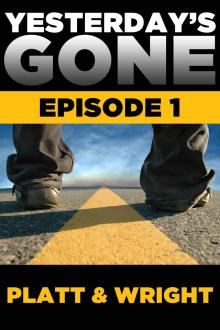 Yesterday's Gone: Episode 1
Yesterday's Gone: Episode 1 Yesterday's Gone: Seasons 1-6 Complete Saga
Yesterday's Gone: Seasons 1-6 Complete Saga The Beam- The Complete Series
The Beam- The Complete Series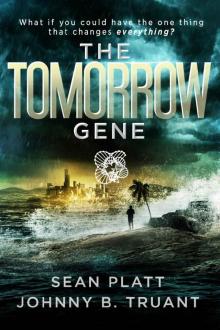 The Tomorrow Gene
The Tomorrow Gene Karma Police: Karma Police Book Two
Karma Police: Karma Police Book Two The Fall (Karma Police Book 5)
The Fall (Karma Police Book 5) The Beam: Season Three
The Beam: Season Three Resurrection
Resurrection No Escape (No Justice Book 2)
No Escape (No Justice Book 2) Deviant (Karma Police Book 4)
Deviant (Karma Police Book 4)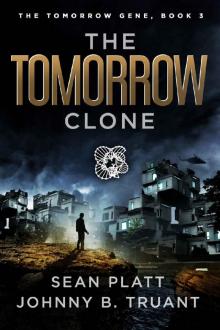 The Tomorrow Clone (The Tomorrow Gene Book 3)
The Tomorrow Clone (The Tomorrow Gene Book 3) Unicorn Western
Unicorn Western Namaste
Namaste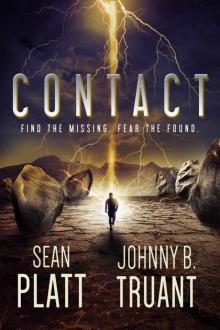 Alien Invasion (Book 2): Contact
Alien Invasion (Book 2): Contact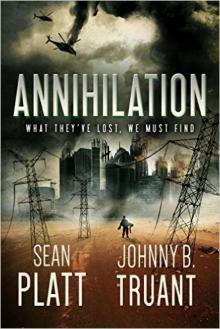 Alien Invasion (Book 4): Annihilation
Alien Invasion (Book 4): Annihilation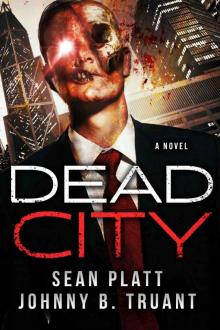 Dead City
Dead City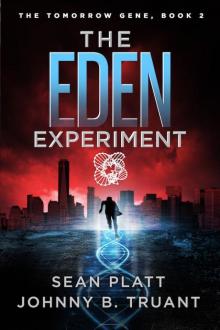 The Eden Experiment
The Eden Experiment Unicorn Genesis (Unicorn Western)
Unicorn Genesis (Unicorn Western)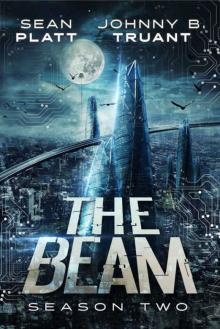 The Beam: Season Two
The Beam: Season Two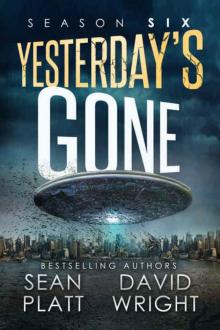 Yesterday's Gone: Season Six
Yesterday's Gone: Season Six Homecoming (Karma Police Book 6)
Homecoming (Karma Police Book 6)![[Alien Invasion 01.0] Invasion Read online](http://i1.bookreadfree.com/i1/03/30/alien_invasion_01_0_invasion_preview.jpg) [Alien Invasion 01.0] Invasion
[Alien Invasion 01.0] Invasion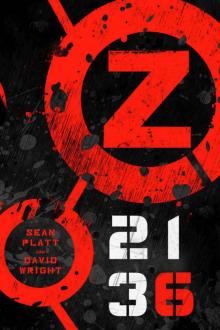 Z 2136 (Z 2134 Series Book 3)
Z 2136 (Z 2134 Series Book 3)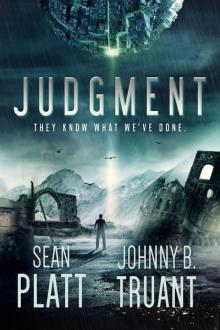 Alien Invasion (Book 5): Judgment
Alien Invasion (Book 5): Judgment Threshold
Threshold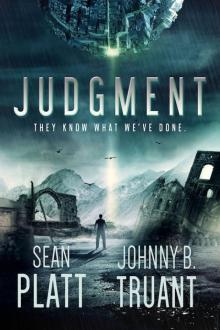 Judgment
Judgment Jumper: Karma Police Book One
Jumper: Karma Police Book One Boricio Goes Camping (Dark Crossings)
Boricio Goes Camping (Dark Crossings)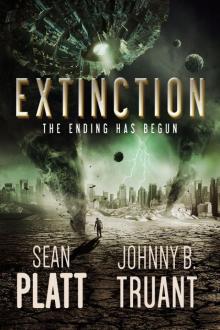 Extinction
Extinction Yesterday's Gone (Season Four): Episodes 19-24
Yesterday's Gone (Season Four): Episodes 19-24![[No Justice 01.0] No Justice Read online](http://i1.bookreadfree.com/i2/04/09/no_justice_01_0_no_justice_preview.jpg) [No Justice 01.0] No Justice
[No Justice 01.0] No Justice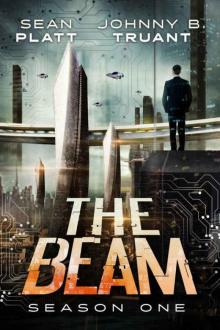 The Beam: Season One
The Beam: Season One La Fleur de Blanc
La Fleur de Blanc The Collectors (Karma Police Book 3)
The Collectors (Karma Police Book 3)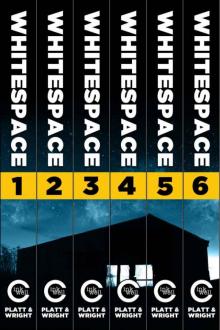 WhiteSpace: Season One (Episodes 1-6 of the sci-fi horror serial)
WhiteSpace: Season One (Episodes 1-6 of the sci-fi horror serial)